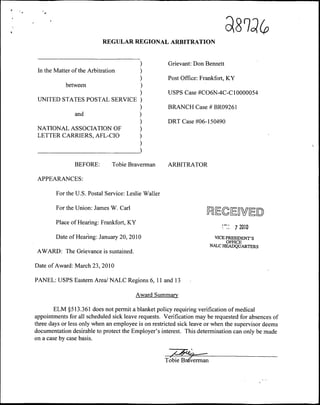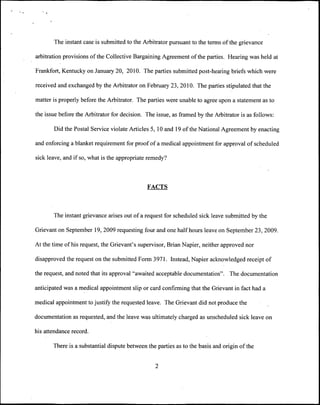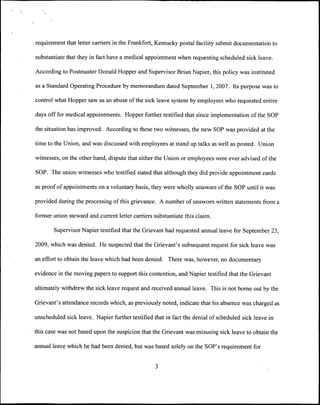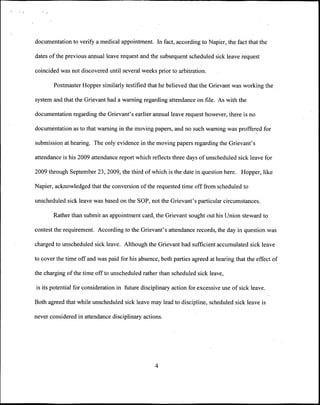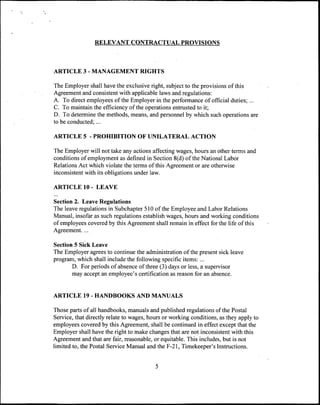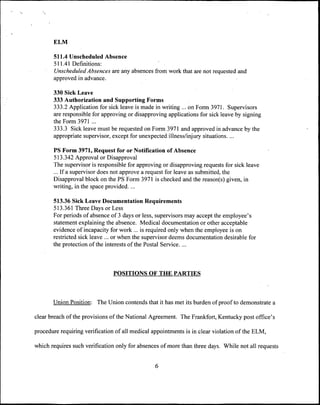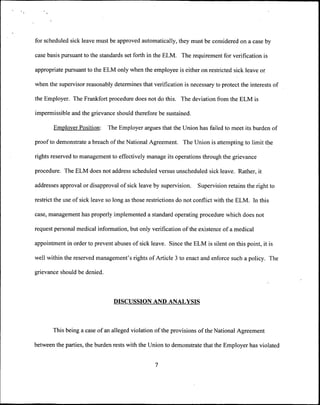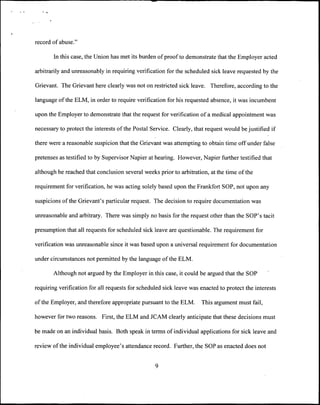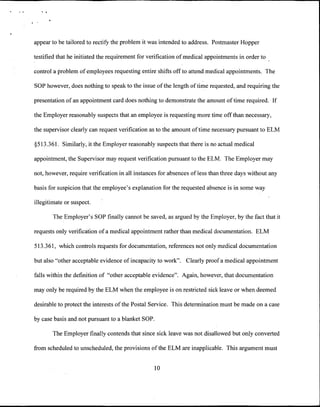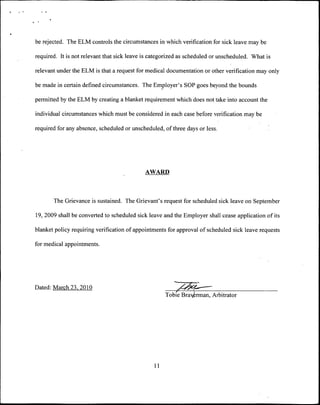C-28726
- 1. d.^V(p REGULAR REGIONAL ARBITRATION Grievant: Don Bennett In the Matter of the Arbitration Post Office: Frankfort, KY between USPS Case #C06N-4C-C 10000054 UNITED STATES POSTAL SERVICE BRANCH Case # BR09261 and DRT Case #06-150490 NATIONAL ASSOCIATION OF LETTER CARRIERS, AFL-CIO BEFORE: Tobie Braverman ARBITRATOR APPEARANCES: For the U.S. Postal Service: Leslie Waller For the Union: James W. Carl ^ECEDWEO Place of Hearing: Frankfort, KY ŌĆó":: 7 2010 Date of Hearing: January 20, 2010 VICE PRESIDENT'S OFHCE NALC HEADQUARTERS AWARD: The Grievance is sustained. Date of Award: March 23, 2010 PANEL: USPS Eastern Area/ NALC Regions 6, 11 and 13 Award Summary ELM ┬¦513.361 does not permit a blanket policy requiring verification of medical appointments for all scheduled sick leave requests. Verification may be requested for absences of three days or less only when an employee is on restricted sick leave or when the supervisor deems documentation desirable to protect the Employer's interest. This determination can only be made on a case by case basis. Tobie Brm'erman
- 2. The instant case is submitted to the Arbitrator pursuant to the terms of the grievance arbitration provisions of the Collective Bargaining Agreement of the parties. Hearing was held at Frankfort, Kentucky on January 20, 2010. The parties submitted post-hearing briefs which were received and exchanged by the Arbitrator on February 23, 2010. The parties stipulated that the matter is properly before the Arbitrator. The parties were unable to agree upon a statement as to the issue before the Arbitrator for decision. The issue, as framed by the Arbitrator is as follows: Did the Postal Service violate Articles 5, 10 and 19 of the National Agreement by enacting and enforcing a blanket requirement for proof of a medical appointment for approval of scheduled sick leave, and if so, what is the appropriate remedy? FACTS The instant grievance arises out of a request for scheduled sick leave submitted by the Grievant on September 19, 2009 requesting four and one half hours leave on September 23, 2009. At the time of his request, the Grievant's supervisor, Brian Napier, neither approved nor disapproved the request on the submitted Form 3971. Instead, Napier acknowledged receipt of the request, and noted that its approval "awaited acceptable documentation". The documentation anticipated was a medical appointment slip or card confirming that the Grievant in fact had a medical appointment to justify the requested leave. The Grievant did not produce the documentation as requested, and the leave was ultimately charged as unscheduled sick leave on his attendance record. There is a substantial dispute between the parties as to the basis and origin of the 2
- 3. requirement that letter carriers in the Frankfort, Kentucky postal facility submit documentation to substantiate that they in fact have a medical appointment when requesting scheduled sick leave. According to Postmaster Donald Hopper and Supervisor Brian Napier, this policy was instituted as a Standard Operating Procedure by memorandum dated September 1, 2007. Its purpose was to control what Hopper saw as an abuse of the sick leave system by employees who requested entire days off for medical appointments. Hopper further tesfified that since implementation of the SOP the situation has improved. According to these two witnesses, the new SOP was provided at the time to the Union, and was discussed with employees at stand up talks as well as posted. Union witnesses, on the other hand, dispute that either the Union or employees were ever advised of the SOP. The union witnesses who testified stated that although they did provide appointment cards as proof of appointments on a voluntary basis, they were wholly unaware of the SOP until it was provided during the processing of this grievance. A number of unsworn written statements from a former union steward and current letter carriers substantiate this claim. Supervisor Napier testified that the Grievant had requested annual leave for September 23, 2009, which was denied. He suspected that the Grievant's subsequent request for sick leave was an effort to obtain the leave which had been denied. There was, however, no documentary evidence in the moving papers to support this contention, and Napier testified that the Grievant ultimately withdrew the sick leave request and received annual leave. This is not borne out by the Grievant's attendance records which, as previously noted, indicate that his absence was charged as unscheduled sick leave. Napier further testified that in fact the denial of scheduled sick leave in this case was not based upon the suspicion that the Grievant was misusing sick leave to obtain the annual leave which he had been denied, but was based solely on the SOP's requirement for 3
- 4. documentation to verify a medical appointment. In fact, according to Napier, the fact that the dates of the previous annual leave request and the subsequent scheduled sick leave request coincided was not discovered until several weeks prior to arbitration. Postmaster Hopper similarly testified that he believed that the Grievant was working the system and that the Grievant had a warning regarding attendance on file. As with the documentation regarding the Grievant's earlier annual leave request however, there is no documentation as to that warning in the moving papers, and no such warning was proffered for submission at hearing. The only evidence in the moving papers regarding the Grievant's attendance is his 2009 attendance report which reflects three days of unscheduled sick leave for 2009 through September 23, 2009, the third of which is the date in question here. Hopper, like Napier, acknowledged that the conversion of the requested time off from scheduled to unscheduled sick leave was based on the SOP, not the Grievant's particular circumstances. Rather than submit an appointment card, the Grievant sought out his Union steward to contest the requirement. According to the Grievant's attendance records, the day in question was charged to unscheduled sick leave. Although the Grievant had sufficient accumulated sick leave to cover the time off and was paid for his absence, both parties agreed at hearing that the effect of the charging of the time off to unscheduled rather than scheduled sick leave, is its potential for consideration in future disciplinary action for excessive use of sick leave. Both agreed that while unscheduled sick leave may lead to discipline, scheduled sick leave is never considered in attendance disciplinary actions. 4
- 5. RELEVANT CONTRACTUAL PROVISIONS ARTICLE 3 - MANAGEMENT RIGHTS The Employer shall have the exclusive right, subject to the provisions of this Agreement and consistent with applicable laws and regulations: A. To direct employees of the Employer in the performance of official duties; ... C. To maintain the efficiency of the operations entrusted to it; D. To determine the methods, means, and personnel by which such operations are to be conducted;... ARTICLE 5 - PROHIBITION OF UNILATERAL ACTION The Employer will not take any actions affecting wages, hours an other terms and conditions of employment as defined in Section 8(d) of the National Labor Relations Act which violate the terms of this Agreement or are otherwise inconsistent with its obligations under law. ARTICLE 10 - LEAVE Section 2. Leave Regulations The leave regulations in Subchapter 510 of the Employee and Labor Relations Manual, insofar as such regulations establish wages, hours and working conditions of employees covered by this Agreement shall remain in effect for the life of this Agreement. ... Section 5 Sick Leave The Employer agrees to continue the administration of the present sick leave program, which shall include the following specific items: ... D. For periods of absence of three (3) days or less, a supervisor may accept an employee's certification as reason for an absence. ARTICLE 19 - HANDBOOKS AND MANUALS Those parts of all handbooks, manuals and published regulations of the Postal Service, that directly relate to wages, hours or working conditions, as they apply to employees covered by this Agreement, shall be continued in effect except that the Employer shall have the right to make changes that are not inconsistent with this Agreement and that are fair, reasonable, or equitable. This includes, but is not limited to, the Postal Service Manual and the F-21, Timekeeper's Instructions. 5
- 6. ELM 511.4 Unscheduled Absence 511.41 Definitions: Unscheduled Absences are any absences from work that are not requested and approved in advance. 330 Sick Leave 333 Authorization and Supporting Forms 333.2 Application for sick leave is made in writing ... on Form 3971. Supervisors are responsible for approving or disapproving applications for sick leave by signing the Form 3971 ... 333.3 Sick leave must be requested on Form 3971 and approved in advance by the appropriate supervisor, except for unexpected illness/injury situations. ... PS Form 3971, Request for or Notification of Absence 513.342 Approval or Disapproval The supervisor is responsible for approving or disapproving requests for sick leave ... If a supervisor does not approve a request for leave as submitted, the Disapproval block on the PS Form 3971 is checked and the reason(s) given, in writing, in the space provided. ... 513.36 Sick Leave Documentation Requirements 513.361 Three Days or Less For periods of absence of 3 days or less, supervisors may accept the employee's statement explaining the absence. Medical documentation or other acceptable evidence of incapacity for work ... is required only when the employee is on restricted sick leave ... or when the supervisor deems documentation desirable for the protection of the interests of the Postal Service.... POSITIONS OF THE PARTIES Union Position: The Union contends that it has met its burden of proof to demonstrate a clear breach of the provisions of the National Agreement. The Frankfort, Kentucky post office's procedure requiring verification of all medical appointments is in clear violation of the ELM, which requires such verification only for absences of more than three days. While not all requests 6
- 7. for scheduled sick leave must be approved automatically, they must be considered on a case by case basis pursuant to the standards set forth in the ELM. The requirement for verification is appropriate pursuant to the ELM only when the employee is either on restricted sick leave or when the supervisor reasonably determines that verification is necessary to protect the interests of the Employer. The Frankfort procedure does not do this. The deviation from the ELM is impermissible and the grievance should therefore be sustained. Employer Poshion: The Employer argues that the Union has failed to meet its burden of proof to demonstrate a breach of the National Agreement. The Union is attempting to limit the rights reserved to management to effectively manage its operations through the grievance procedure. The ELM does not address scheduled versus unscheduled sick leave. Rather, it addresses approval or disapproval of sick leave by supervision. Supervision retains the right to restrict the use of sick leave so long as those restrictions do not conflict with the ELM. In this case, management has properly implemented a standard operating procedure which does not request personal medical information, but only verification of the existence of a medical appointment in order to prevent abuses of sick leave. Since the ELM is silent on this point, it is well within the reserved management's rights of Article 3 to enact and enforce such a policy. The grievance should be denied. DISCUSSION AND ANALYSIS This being a case of an alleged violation of the provisions of the National Agreement between the parties, the burden rests with the Union to demonstrate that the Employer has violated 7
- 8. the provisions of the Agreement by requiring that the Grievant submit verification of a medical appointment in order to be approved for scheduled sick leave. The crux of this case turns upon whether or not the Union has demonstrated that the Frankfort SOP requiring the presentation of verification of a medical appointment in order to gain approval of scheduled sick leave constitutes a violation of the procedures regarding sick leave as set forth in the ELM.' While the ELM does not specifically address the issue of approval of scheduled versus unscheduled sick leave, it does address the circumstances in which medical documentation or other verification regarding absences may be required for approval of sick leave. The ELM states expressly that supervisors may accept the employee's application for sick leave without requiring verification unless the employee is on restricted sick leave or in circumstances wherein the supervisor determines that documentation is necessary to protect the interests of the Employer. The ELM does not draw any distinction between scheduled and unscheduled sick leave in this limitation on the requirements for production of verification for the use of sick leave. It merely states a general rule regarding verification to be applied to all sick leave of three days or less. Thus, unless an employee is on restricted leave, the Employer may only request verification to support an absence if necessary to protect the interests of the Employer. In circumstances wherein the protection of interests provision is invoked, the J-Cam notes that "[gjenerally to challenge such a decision successfully the union should demonstrate that the supervisor acted arbitrarily, capriciously or unreasonably in requiring the employee to obtain medical documentation. The Union should be prepared to show that the grievant has a good overall sick leave record and no ' There is also a substantial dispute between the parties as to whether or not the SOP was properly enacted and presented to the Union and employees. Based upon the decision here, - however, it is not necessary to determine that issue. 8
- 9. record of abuse." In this case, the Union has met its burden of proof to demonstrate that the Employer acted arbitrarily and unreasonably in requiring verification for the scheduled sick leave requested by the Grievant. The Grievant here clearly was not on restricted sick leave. Therefore, according to the language of the ELM, in order to require verification for his requested absence, it was incumbent upon the Employer to demonstrate that the request for verification of a medical appointment was necessary to protect the interests of the Postal Service. Clearly, that request would be justified if there were a reasonable suspicion that the Grievant was attempting to obtain time off under false pretenses as testified to by Supervisor Napier at hearing. However, Napier further testified that although he reached that conclusion several weeks prior to arbitration, at the time of the requirement for verification, he was acting solely based upon the Frankfort SOP, not upon any suspicions of the Grievant's particular request. The decision to require documentation was unreasonable and arbitrary. There was simply no basis for the request other than the SOP's tacit presumption that all requests for scheduled sick leave are questionable. The requirement for verification was unreasonable since it was based upon a universal requirement for documentation under circumstances not permitted by the language of the ELM. Although not argued by the Employer in this case, it could be argued that the SOP requiring verification for all requests for scheduled sick leave was enacted to protect the interests of the Employer, and therefore appropriate pursuant to the ELM. This argument must fail, however for two reasons. First, the ELM and JCAM clearly anticipate that these decisions must be made on an individual basis. Both speak in terms of individual applications for sick leave and review of the individual employee's attendance record. Further, the SOP as enacted does not 9
- 10. appear to be tailored to rectify the problem it was intended to address. Postmaster Hopper testified that he initiated the requirement for verification of medical appointments in order to control a problem of employees requesting entire shifts off to attend medical appointments. The SOP however, does nothing to speak to the issue of the length of time requested, and requiring the presentation of an appointment card does nothing to dernonstrate the amount of time required. If the Employer reasonably suspects that an employee is requesting more time off than necessary, the supervisor clearly can request verification as to the amount of time necessary pursuant to ELM ┬¦513.361. Similarly, it the Employer reasonably suspects that there is no actual medical appointment, the Supervisor may request verification pursuant to the ELM. The Employer may not, however, require verification in all instances for absences of less than three days without any basis for suspicion that the employee's explanation for the requested absence is in some way illegitimate or suspect. The Employer's SOP finally cannot be saved, as argued by the Employer, by the fact that it requests only verification of a medical appointment rather than medical documentation. ELM 513.361, which controls requests for documentation, references not only medical documentation but also "other acceptable evidence of incapacity to work". Clearly proof a medical appointment falls within the definition of "other acceptable evidence". Again, however, that documentation may only be required by the ELM when the employee is on restricted sick leave or when deemed desirable to protect the interests of the Postal Service. This determination must be made on a case by case basis and not pursuant to a blanket SOP. The Employer finally contends that since sick leave was not disallowed but only converted from scheduled to unscheduled, the provisions of the ELM are inapplicable. This argument must 10
- 11. be rejected. The ELM controls the circumstances in which verification for sick leave may be required. It is not relevant that sick leave is categorized as scheduled or unscheduled. What is relevant under the ELM is that a request for medical documentation or other verification may only be made in certain defined circumstances. The Employer's SOP goes beyond the bounds permitted by the ELM by creating a blanket requirement which does not take into account the individual circumstances which must be considered in each case before verification may be required for any absence, scheduled or unscheduled, of three days or less. AWARD The Grievance is sustained. The Grievant's request for scheduled sick leave on September 19, 2009 shall be converted to scheduled sick leave and the Employer shall cease application of its blanket policy requiring verification of appointments for approval of scheduled sick leave requests for medical appointments. Dated: March 23. 2010 / ^ ^ Tobie Braviferman, Arbitrator 11
